

Thomas Wilkinson - a Methodist pioneer in Australia
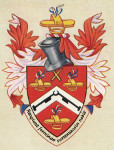 In 1820 he
married Louisa Price (born in Gosport in 1800) at St
George-in-the-East, a Church of England marriage being the only option
for nonconformists at that time. In due course they were to have
eleven children (three of whom died in infancy, in London and
Australia). Living at White Horse Place off the Commercial Road (in the
parish of Stepney), in
1823 Thomas was admitted to the Worshipful Company of Pattenmakers 'by
redemption' (paying a fee of £2 6s 8d in lieu of apprenticeship),
becoming a member of the livery and a freeman of City of London, in
order to pursue the trade of a sailmaker. (There had once been a
sailmakers livery company, but despite the trade continuing it had
ceased to exist, so sailmakers looked elsewhere to establish their
trade credentials. Although patten-making [wooden overshoes to wear in
the mucky streets of London] was in decline, its guild, 70th in the
table of precedence, and with a city church base at St Margaret
Pattens, continued - right.) In 1824 the Wilkinsons moved to Vinegar
Lane, Ratcliff and in 1826 to Upper John [later Blakesley] Street where
he became
a coal meter or measurer (determining the excise due on ships importing
coal to the docks). This employment came to an end in 1832, when he was
offered an annual pension of £90 (based on his wages as a class 3
deputy coal meter of £170 12s 3s) or a lump sum of £2,000. He wisely
chose the former, which was paid quarterly to him in Australia (via his
son-in-law George Reed) until at least 1840, and probably beyond.
In 1820 he
married Louisa Price (born in Gosport in 1800) at St
George-in-the-East, a Church of England marriage being the only option
for nonconformists at that time. In due course they were to have
eleven children (three of whom died in infancy, in London and
Australia). Living at White Horse Place off the Commercial Road (in the
parish of Stepney), in
1823 Thomas was admitted to the Worshipful Company of Pattenmakers 'by
redemption' (paying a fee of £2 6s 8d in lieu of apprenticeship),
becoming a member of the livery and a freeman of City of London, in
order to pursue the trade of a sailmaker. (There had once been a
sailmakers livery company, but despite the trade continuing it had
ceased to exist, so sailmakers looked elsewhere to establish their
trade credentials. Although patten-making [wooden overshoes to wear in
the mucky streets of London] was in decline, its guild, 70th in the
table of precedence, and with a city church base at St Margaret
Pattens, continued - right.) In 1824 the Wilkinsons moved to Vinegar
Lane, Ratcliff and in 1826 to Upper John [later Blakesley] Street where
he became
a coal meter or measurer (determining the excise due on ships importing
coal to the docks). This employment came to an end in 1832, when he was
offered an annual pension of £90 (based on his wages as a class 3
deputy coal meter of £170 12s 3s) or a lump sum of £2,000. He wisely
chose the former, which was paid quarterly to him in Australia (via his
son-in-law George Reed) until at least 1840, and probably beyond. | We have much
pleasure in announcing that the Rev Thomas Wilkinson [he was not in
fact ordained], the missionary appointed by the government for the
aborigines, has arrived at the colony on Flinder's Island, and
commenced his arduous but interesting labours …. The Blacks at
Flinders, we are happy to learn, are not only extremely happy and
contented in themselves, but are every day occupied in some useful and
industrious occupation. They already begin to receive a relish for the
improved habits of civilised life. They take a sort of pride in
arranging the furniture and utensils in their little huts, sweeping
them out daily, decorating and keeping them clean. In place also of
allowing their dogs to sleep with them as formerly, they have built
little kennels or houses for them out of doors, and in order that these
faithful animals, for whom they have so much affection, may not suffer
inconvenience from cold in the change, they nightly light fires beside
them before they themselves go to rest. |
| In the beginning God created the heavens and the earth, and darkness was upon the face of the deep. |
| troteh Godneh pomleh heavenneh co-entanneh, lywerreh crackny. |
| God said, Let there be light, and there was light; And God saw the light that is was good. God divided the light from the darkness. |
| Godneh kany, tryittyeh - tryttityeh crackny; Godne lapre trytittyeh - narreh coopeh. Godneh dyvidneh trytittyeh lywerreh. |
| God said, Le the earth bring forth grass, and it was so. |
| Godneh kany, coentanneh ninginneh rothinneh, tibreh. |
| God made two great lights - the greater light to rule the day, and the lesser light to rule the night; he made the stars also. |
| Godneh pomleh cathehbyweh trytittyeh laackrennneh wakehlenneh tywerreh [moon]; narreh pomleh pullenneh. |
| God set them in the firmament of heaven to give light upon the earth. |
| Godneh propre narreh wyehticketteh tringinneh trytittyeh. |
| And God made great whales, and every living creature that moveth which the waters brought forth abundantly. |
| Godneh pomleh lackrennah [great], pynungyneh [fish], gadyeh [plenty] pyungyneh. |
| And God made the beasts of the earth and he saw that it was very good. |
| Godneh pomleh packilleh [bullock] illa [kangaroo] Godneh lapreh narreh coopeh. |
| And God said, Let us make man in our own image, after our own likeness.So God created man in his own image. |
| Godneh kany, myneh pomleh wibeh, likeh myne. Godneh pomleh wibeh likeh narreh. |
| God saw everything that he had made, and behold it was very good! |
| Godneh lapre gadyeh narreh pomleh, narreh kany narreh coopeh coopeh! |
| [Wilkinson to McLachlan] Dear Sir, I am sorry to trouble you with this note, but I understand Mianogoonia or Wild Mary sleeps in your house. This I conceive, to say the least, is highly imprudent and I hope you will send her away to her own hut. Yours respectfully, Thomas Wilkinson |
| [McLachlan to Wilkinson] Sir, I have to acknowledge receipt of your note of this date and beg to inform you I have forwarded the same to the Commandant [Darling] to whom I refer you for any further explanation. I have the honour to be, Sir, your obedient servant, Arch. McLachlan |
| [Wilkinson to Darling] Aboriginal Establishment, Oct 4th 1833
Dear Sir,Having lately missed Prnagoontsi (better known by the name of Wild Mary) out of the native huts, I made enquiries about her, for I found that she lived and slept at the Doctor's house. This I thought without some urgent circumstances (of the existence of which I was not aware) that called for it, highly imprudent, and consequently wrote to him this morning on the subject. Without, however, giving me any explanation, he strangely refers to for further explanation to you. This I should be thankful to have, for my own comfort and character and, as well, the credit of the Establishment. For I do not think it a prudent thing, that the Surgeon, who is a single man, should have living with him, and sleeping in his house, a young single woman. Yours respectfully, Thomas Wilkinson |
| [Wilkinson to Darling again] Surely you could not make it a necessity for her [Wild Mary] to sleep there [Doctor's Hut] if the sick man required any one to wait upon him. His woman was there to do it, and if anyone else was wanted, another woman with her Uiba [man] could easily have been obtained, or if that would not do, one of the elderly women without a Uiba [man] should have been brought in, but the last resort should have been a single and young woman, from which it does not appear from your letter there was the least shadow of necessity. If however you are satisfied with the preferring necessity of a single and young woman sleeping under the Doctor's roof, I certainly am not and unless she is sent to her own hut I must complain to his Excellency the Governor. |
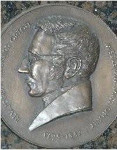 By 1839, there were three more children, and in 1840 they all arrived at Hobson's Bay aboard the Joshua Carol
– he was 41. He was reunited with John Joseph Peers, another Methodist
layman he had known in Hobart and who was setting up as a builder and
contractor, and also with his old friend Joseph Orton,
who had been the first ordained minister to preach in the Port Phillip
settlement under the oaks of Batman's Hill in 1836 (reading, it is
reported here, from the Book of Common Prayer). Thomas wrote glowingly of the 1840 Easter Day service at Swanston Street chapel. See W.L. Blamires & John B. Smith The Early Story of the Wesleyan Methodist Church in Victoria (1886), and this account of Orton [right] by his great great grand-daughter
By 1839, there were three more children, and in 1840 they all arrived at Hobson's Bay aboard the Joshua Carol
– he was 41. He was reunited with John Joseph Peers, another Methodist
layman he had known in Hobart and who was setting up as a builder and
contractor, and also with his old friend Joseph Orton,
who had been the first ordained minister to preach in the Port Phillip
settlement under the oaks of Batman's Hill in 1836 (reading, it is
reported here, from the Book of Common Prayer). Thomas wrote glowingly of the 1840 Easter Day service at Swanston Street chapel. See W.L. Blamires & John B. Smith The Early Story of the Wesleyan Methodist Church in Victoria (1886), and this account of Orton [right] by his great great grand-daughter
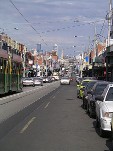 Also, at one of three Crown
auctions, together with another Methodist, Edward Stone Parker,
who had
come to Melbourne in 1839 as assistant 'Protector of Aborigines'
(probably the most sensitive of those who held this office), he also
bought three square miles (180 acres) of land between the Merri and
Moonee Ponds creeks, three miles north of the settlement – land in 'town'
had become too expensive. This may have appeared unpromising – it was
tough scrubland covered in eucalyptus trees, whose Aboriginal
name Boort Moornmount Bullarto
meant (accurately) 'very windy country'; however, the settlers'
original name was
Bricklands, since it was rich in clay, for brickmaking; and in due
course, the 'New Sydney Road' linking Melbourne to Sydney (mainly built
by chain gangs) ran through their land. So it was to prove a wise
purchase, though the way it was parcelled out, with large and long
strips off a narrow road [survey map right], was to cause long-term problems. Right is Syndey Road today.
Also, at one of three Crown
auctions, together with another Methodist, Edward Stone Parker,
who had
come to Melbourne in 1839 as assistant 'Protector of Aborigines'
(probably the most sensitive of those who held this office), he also
bought three square miles (180 acres) of land between the Merri and
Moonee Ponds creeks, three miles north of the settlement – land in 'town'
had become too expensive. This may have appeared unpromising – it was
tough scrubland covered in eucalyptus trees, whose Aboriginal
name Boort Moornmount Bullarto
meant (accurately) 'very windy country'; however, the settlers'
original name was
Bricklands, since it was rich in clay, for brickmaking; and in due
course, the 'New Sydney Road' linking Melbourne to Sydney (mainly built
by chain gangs) ran through their land. So it was to prove a wise
purchase, though the way it was parcelled out, with large and long
strips off a narrow road [survey map right], was to cause long-term problems. Right is Syndey Road today. Parker withdrew.Thomas was no mere speculator, but aspired to fashion a township. He
named the area Brunswick, probably after Princess Caroline, the late wife of
George IV (and more popular than him in public estimation - see here for an English take on this, and here for an Australian one.) The
two main streets were named for Victoria and Albert. Half-acre blocks
were created, and Methodism established with the early proceeds: a
wattle and daub chapel, soon replaced by a brick building (a new church
followed in 1872). For his own family he built a small austere slab house [left with Thomas outside], surrounded with a log fence. When they moved to
Portland in 1842 it was rented out, together with several acres, and
used as the post office until a new one was built further along Sydney
Road in 1852. More details about early Brunswick here.
Parker withdrew.Thomas was no mere speculator, but aspired to fashion a township. He
named the area Brunswick, probably after Princess Caroline, the late wife of
George IV (and more popular than him in public estimation - see here for an English take on this, and here for an Australian one.) The
two main streets were named for Victoria and Albert. Half-acre blocks
were created, and Methodism established with the early proceeds: a
wattle and daub chapel, soon replaced by a brick building (a new church
followed in 1872). For his own family he built a small austere slab house [left with Thomas outside], surrounded with a log fence. When they moved to
Portland in 1842 it was rented out, together with several acres, and
used as the post office until a new one was built further along Sydney
Road in 1852. More details about early Brunswick here. Portland
Portland| That excellent cart Stallion is now offered for sale by
private contract. He is a superior collar horse, drawing quietly in
harness, and otherwise perfectly docile. For bone and sinew his is not
surpassed, and would pay the purchase money during the approaching
season. Age, rising eight years. He is at present standing in the
stables of Mr Dale, Commercial Inn, Portland, where at any time he may
be seen. Further particulars known on enquiry being made to the
undersigned, who is authorised to treat with parties for his purchase.
WM. M'DOWALL [William M'Dowall had set up the first grocery shop in town] |
| Whatever the nature of any improvements,
the town and district are chiefly indebted to the spirit and enterprise
of the early settlers. To the government they owe nothing. No
thanks to Sir George Gipps or his defunct government for anything that
the district is or hopes to be. |

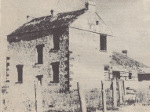 Thomas built the
White House - left - (later known as Blythewood) on hills to the south west for his family. In 1849 he
was a member of a committee set up to build a flour mill, to enable
landowners to become more self-sufficient. That same year he and John
set up a newspaper in Warrnambool 66 miles east of Portland, which
became a gold rush port; John caught
'gold fever' and left in 1851 (but he was unlucky). Their partner Osborne
took on the paper but he also deserted and it folded; the press and
types were packed away. When Osborne returned, he bought out the Wilkinsons'
interest and continued to publish until 1867.
Thomas built the
White House - left - (later known as Blythewood) on hills to the south west for his family. In 1849 he
was a member of a committee set up to build a flour mill, to enable
landowners to become more self-sufficient. That same year he and John
set up a newspaper in Warrnambool 66 miles east of Portland, which
became a gold rush port; John caught
'gold fever' and left in 1851 (but he was unlucky). Their partner Osborne
took on the paper but he also deserted and it folded; the press and
types were packed away. When Osborne returned, he bought out the Wilkinsons'
interest and continued to publish until 1867.| To the Editor of the Argus, 10 September 1851 Sir – I hasten to communicate our glorious electioneering success in the town of Portland. The poll was held this day, and beyond our most sanguine expectation, we have succeeded in defeating the election of your ancient and loving friend, Mr Moore, and returning one on whom we can depend for warmly and sincerely advocating the three great local questions about which we are at present chiefly concerned, viz. Portland immigration, Portland land sales, and Portland circuit courts. We consider this a great triumph for the cause of liberty and better government; and we think the Government out now to be convinced that there is too much reason for the frequent complaints that have appeared in our local journals of the neglect and gross injustice Portland had long endured at their hands, since the editor of these very journals the people of Portland have elected as their representative in the first Legislative Council of Victoria. At the close of the poll the numbers were declared by the Returning Officer thus:- for Mr Wilkinson 47, for Mr Moore 41. We deferred to the electors and influence in our town to bring forward a candidate worthy of the representation of this fine but much injured town. And when it was known only at the eleventh hour that the man they proposed was the enemy and persecutor of the liberty of the press; the farmer and mover in the Sydney council of the bills to crush the religious liberty that now exists in the Colonies you may rest assured there was no little indignation felt. It was bad enough to have a non resident proposed over the heads of all the residents in the town; but such a one as Mr Moore has proved himself was indeed felt to be too bad. It was not until the Saturday before the nomination day, that the requisition and his answer appeared in Portland. The day of nomination was the Tuesday following, and what could be done in that short time? Our only hope appeared to have some resident ready to propose, to prevent ourselves from being parties to the return of Mr Moore, and by at least an honourable minority enter a sort of public protest against the sacrifice of the important interests of our town. So without time even to draw up a requisition nor to make any active exertions in the way of canvassing, Mr Wilkinson, the Editor of the Portland Guardian, was nominated on Tuesday and has been elected this day (Wednesday). Every kind of influence was brought to bear against us, when it was known that another candidate was brought into the field. I could record instances of petty tyranny, intimidation, etc. by which many whose hearts were with us were compelled to vote against us. But in spite of all we have triumphed. Many of those who signed the requisition saw clearly that Mr Moore's reply to the requisition – which proposed conditions on which he will consent to stand for the election that are not mentioned in the requisition – honourably released those who signed the requisition from their pledge; and so these will be the beginning of better days of prosperity for Bonnie Portland that she has hitherto had. I find there is no time to write more or even to read over what I have written before the post leaves. Therefore in haste, a Portland Elector |
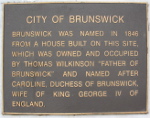 What was the
gist of the three great local issues mentioned – was it simply that
they felt neglected? There was certainly resentment that only minor
court cases were held in Portland, under Blair: others involved a
journey to Melbourne. And what was the religious liberty issue – all
denominations seem to have established themselves in Portland? In any
event, it was a little ironic that, having stood against Moore partly on the basis that he was a
non-resident, Thomas himself moved back to Melbourne to devote himself
fully to his parliamentary duties, though as a local he continued to have Portland's interests at heart. (In 1853 he sold the Portland Guardian,
together with his house, to the Revd T.E. Richardson, who resigned from
the Presbyterian church to take this on.) On his return to Brunswick,
he found only two rooms of his house remaining, and the log fence sold
for fuel. (The site is now a furniture store – in 1986 a commemorative
plaque - left - was installed.)
What was the
gist of the three great local issues mentioned – was it simply that
they felt neglected? There was certainly resentment that only minor
court cases were held in Portland, under Blair: others involved a
journey to Melbourne. And what was the religious liberty issue – all
denominations seem to have established themselves in Portland? In any
event, it was a little ironic that, having stood against Moore partly on the basis that he was a
non-resident, Thomas himself moved back to Melbourne to devote himself
fully to his parliamentary duties, though as a local he continued to have Portland's interests at heart. (In 1853 he sold the Portland Guardian,
together with his house, to the Revd T.E. Richardson, who resigned from
the Presbyterian church to take this on.) On his return to Brunswick,
he found only two rooms of his house remaining, and the log fence sold
for fuel. (The site is now a furniture store – in 1986 a commemorative
plaque - left - was installed.)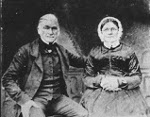 His third
newspaper was the Brunswick Record, set up with son James in 1852,
John joining them in 1858 when it became the Brunswick and Pentridge
Press and East Bourke Advertiser. Brunswick was on the route to the
goldfields and developed rapidly, becoming a municipality in 1857, with
a council of seven, of which Thomas was elected chairman, and a town in
1866, of which he was the first mayor [right with Louisa in 1857]. He and other members put up
their property as security to get the banks to lend money. (Meetings
were held at the Cornish Arms hotel, and subsequently at the Wesleyan
Chapel.) He was appointed a Justice of the Peace.
His third
newspaper was the Brunswick Record, set up with son James in 1852,
John joining them in 1858 when it became the Brunswick and Pentridge
Press and East Bourke Advertiser. Brunswick was on the route to the
goldfields and developed rapidly, becoming a municipality in 1857, with
a council of seven, of which Thomas was elected chairman, and a town in
1866, of which he was the first mayor [right with Louisa in 1857]. He and other members put up
their property as security to get the banks to lend money. (Meetings
were held at the Cornish Arms hotel, and subsequently at the Wesleyan
Chapel.) He was appointed a Justice of the Peace.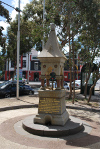 Thomas retired
from public life in 1867, with a comfortable income from his
properties, and continuing his Methodist links (the chapel was next
door to his home!) and died in 1881 aged 82. Left is a drinking fountain in the centre of Brunswick that bears his name.
Thomas retired
from public life in 1867, with a comfortable income from his
properties, and continuing his Methodist links (the chapel was next
door to his home!) and died in 1881 aged 82. Left is a drinking fountain in the centre of Brunswick that bears his name.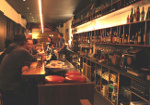 His family
continued to flourish. Sarah (born in Launceston in 1839) was the first
woman to qualify as a chemist in Victoria; she was an active member of
the Women's National League of Victoria, and involved in various
charitable activities in Brunswick. James (born in Launceston in 1836)
and Louisa (their first child, born in London in 1822) were among the
founders of the Melbourne Philharmonic Society – James the leading
tenor and flautist, and Louisa the leading sporano. James' sons
Frederick and James became involved in the first legal minimum wage
case, in Agricultural Workers' Union v Harvester (1907) – James was the
secretary, and President of the Melbourne Trades Hall Council.
A final snub to the Methodist teetotal principles of Brunwsick's founder: 'Mr Wilkinson', in Lygon Street - right - is a wine bar!
His family
continued to flourish. Sarah (born in Launceston in 1839) was the first
woman to qualify as a chemist in Victoria; she was an active member of
the Women's National League of Victoria, and involved in various
charitable activities in Brunswick. James (born in Launceston in 1836)
and Louisa (their first child, born in London in 1822) were among the
founders of the Melbourne Philharmonic Society – James the leading
tenor and flautist, and Louisa the leading sporano. James' sons
Frederick and James became involved in the first legal minimum wage
case, in Agricultural Workers' Union v Harvester (1907) – James was the
secretary, and President of the Melbourne Trades Hall Council.
A final snub to the Methodist teetotal principles of Brunwsick's founder: 'Mr Wilkinson', in Lygon Street - right - is a wine bar!Back to History | Back to Dissenters and Nonconformists (3)